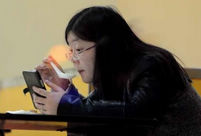 Sichuan money wall for dividend payment
Sichuan money wall for dividend payment Li Na crashes Belinda Bencic in 2nd round at Australian Open
Li Na crashes Belinda Bencic in 2nd round at Australian Open
 Shocking moments when PLA's weapons open fire
Shocking moments when PLA's weapons open fire Famous Lanzhou beef noodles
Famous Lanzhou beef noodles Armed Police hold anti-terrorism drill in SE China's Xiamen
Armed Police hold anti-terrorism drill in SE China's Xiamen Harbin Int'l Ice and Snow Festival opens
Harbin Int'l Ice and Snow Festival opens 'Jin' named the word of the year by cross-strait netizens
'Jin' named the word of the year by cross-strait netizens Chinese scientific expedition goes to build new Antarctica station
Chinese scientific expedition goes to build new Antarctica station
 Chinese naval escort fleet conducts replenishment in Indian Ocean
Chinese naval escort fleet conducts replenishment in Indian OceanHOUSTON, Jan. 16 -- China-U.S. relations have kept moving forward since the two countries established diplomatic ties in 1979, said a Chinese envoy on the occasion of the 35th anniversary of the diplomatic relationship.
"Today China and the U.S. have become a community of intertwined interests and we have the most important bilateral relationship in the world," Xu Erwen, Chinese Consul General in Houston, told Xinhua in a recent interview.
The Chinese diplomat added that "we have come all the way from mutual isolation and hostility 35 years ago to where we are now."
The year of 2014 not only marks the 35th anniversary of the establishment of the China-U.S. diplomatic relationship, but also the 35th anniversary of China's late leader Deng Xiaoping's ground-breaking U.S. visit and the opening of the Chinese Consulate General in Houston, China's first consulate in the U.S..
The picture of Deng donning a cowboy hat at a Texas rodeo during his visit to the U.S. has remained a valuable memory symbolizing the dynamic exchanges bewteen Chinese and American people, Xu said.
She said that China's Consulate General in Houston witnessed the ongoing advancement of the China-U.S. relations.
The two countries have enhanced their exchanges at various levels with the number of dialogue and cooperation mechanisms increased from zero to more than 90. [ Bilateral high-level exchanges also picked up pace, with the holding of five rounds of the Strategic and Economic Dialogue (S&ED) and four rounds of the China-U.S. High-level Consultation on People-to-people Exchange (CPE), Xu said.
Bilateral trade volume increased from 2.45 billion U.S. dollars in 1979 to over 500 billion dollars last year. China is America's number one source of imports and the third biggest export market. The mutual investment started from virtually nil to 100 billion dollars last year, she said.
"Recent years have seen dramatic increase of China's direct investment in the U.S., which registered an annual growth rate of 71 percent since 2008. As of last September, Chinese enterprises' non-financial investment in the U.S. has totalled 14.33 billion dollars," Xu said.
Southern American states witnessed the rapid growth of investment from more than 120 Chinese enterprises, which has brought an amount of 11.86 billion dollars and thousands of job opportunities.
The trade volume between China and the eight southern states totalled 109.3 billion dollars in 2012 and is expected to be even higher in 2013, Xu said.
The people-to-people exchange between the two countries was enhanced, with the daily nunmber of two-way travellers exceeding 10,000. A total of 41 pairs of friendly states and provinces and 201 pairs of friendly cities have been forged between the two countries, Xu said.
As the world's biggest developing country and developed one, China and the U.S. cooperated and coordinated closely in world and regional affairs, such as dealing with the financial crisis, climate change, energy security and food safety, and in addressing regional issues like the Korean Peninsula nuclear issue, Iran's nuclear program and the Syrian crisis, Xu said.
The consensus reached by Chinese President Xi Jinping and his U.S. counterpart Barack Obama on building a new type of major-country relationship based on mutual trust and reciprocal cooperation pointed out the right direction and charted a new course for future China-U.S. ties, she stressed.
China and the U.S., committed to safeguarding world peace and stability, should work together to oppose Japan's attempts to deny the outcome of World War II, and to deny and challenge the post-war international order, Xu said.
Xu hoped that the two countries can seize the opportunity of China's reform to strengthen their cooperation, promote the new type of relationship and bring more benefits to people on both sides.
"China's reform will not only invigorate itself, but also benefit the U.S. and the world as a whole," Xu said.
 In photos: Ten 'tuhao' devices in 2013
In photos: Ten 'tuhao' devices in 2013 College students saved from an ice hole by brave citizens
College students saved from an ice hole by brave citizens Gallery: Top 10 box office hits in 2013
Gallery: Top 10 box office hits in 2013 Beautiful churches around the world
Beautiful churches around the world Yang Mi, Hawick Lau hold wedding in Bali
Yang Mi, Hawick Lau hold wedding in Bali 'Phubbing' people seen everywhere
'Phubbing' people seen everywhere World's biggest snack shop in China
World's biggest snack shop in China Shocking moments when PLA's weapons open fire
Shocking moments when PLA's weapons open fire World's fastest train CRH380A assembled in E China
World's fastest train CRH380A assembled in E China China photographs internal structure of water molecule
China photographs internal structure of water molecule 'Predator' makes proposal to girlfriend
'Predator' makes proposal to girlfriend Thousands of fish frozen on Norway sea
Thousands of fish frozen on Norway sea Mechanized infantry brigade in tactical drill
Mechanized infantry brigade in tactical drill Sichuan money wall for dividend payment
Sichuan money wall for dividend payment 40-day spring travel rush starts on Jan. 16
40-day spring travel rush starts on Jan. 16Day|Week|Month